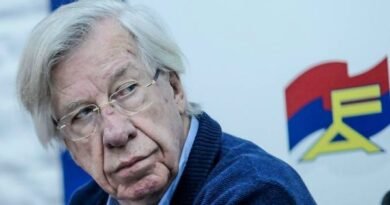Argentina’s FM insists “asymmetries” make EU deal untenable
[ad_1]
Argentina’s FM insists “asymmetries” make EU deal untenable
We have to strengthen ourselves as a bloc, Cafiero told his Mercosur colleagues
Argentina’s Foreign Minister Santiago Cafiero Monday stressed that the trade agreement between Mercosur and the European Union (EU) is hindered by what he called the “asymmetries” between the two blocs.
Cafiero made those remarks during the foreign ministers’ gathering on the opening day of the 62nd Mercosur Summit in Puerto Iguazú, in the Argentine province of Misiones. On Tuesday, the heads of state of the full member countries will convene, and host Alberto Fernández will pass on the pro tempore presidency of the alliance to Brazil’s Luiz Inácio Lula Da Silva.
The Mercosur-EU Agreement, as it was closed in 2019, reflects an unequal effort between asymmetric blocs and does not respond to the current international scenario, Cafiero told his colleagues Mauro Vieira (Brazil); Francisco Bustillo (Uruguay), and Julio César Arriola (Paraguay). Also attending was Bolivia’s Rogelio Mayta, whose country is an associate member of the coalition.
Europe asks us for changes, but does not tell us how we are going to implement them, Cafiero went on while underlining the asymmetries between the blocs.
The GDP of the EU is approximately 6 times larger than that of Mercosur, and 25 of the 27 EU countries have a higher Human Development Index than any of the countries of our bloc, he argued.
Mercosur frees tariffs for 95% of European exports of agricultural goods, while the EU liberalizes only 82% of its agricultural imports from Mercosur and for most of the remainder offers only quotas or fixed preferences, he pointed out.
”The deepening of the link between Mercosur and the EU is a necessary political signal, in an international context of growing conflict and uncertainty. The agreement can be, in our opinion, an effective vehicle for our bloc to enhance its participation in the rearrangement of the global map of production and labor (…) It is a discussion of geopolitical autonomy, Cafiero went on.
The agreement can also function as a framework to catalyze investments in strategic sectors such as energy (conventional and renewable), mining, food, knowledge-based services, and health, among others. However, in order to materialize these potentialities and for the Agreement to have good results for both parties, it is necessary to work and update the 2019 texts,″ he added.
In this time of uncertainty, we have to strengthen ourselves as a bloc and reduce the development gaps, because in today’s world, we have this challenge as a region and this is achieved through more integration and not less. We are not going to achieve anything if we disintegrate, Cafiero also pointed out.
Cafiero also suggested an update to the deal between Mercosur and the European Union was needed and insisted Buenos Aires shared the objective of moving forward with the Mercosur-EU agreement which in its current wording reflects an unequal effort between asymmetric blocs and does not respond to the current international scenario.
The EU and Mercosur are trying to finalize a free trade agreement concluded in principle in 2019, after more than two decades of negotiations, but which is still to be ratified. Resistance from the agricultural sectors of some European countries and, in recent years, concern in the old continent over the environmental policies of former Brazilian President Jair Bolsonaro (2019-2022) stalled progress.
The return to power in Brazil of Luiz Inácio Lula da Silva in January gave new impetus to the dialogue, but environmental demands from the EU outlined in March through an addendum have led nowhere.
[ad_2]
Source link




